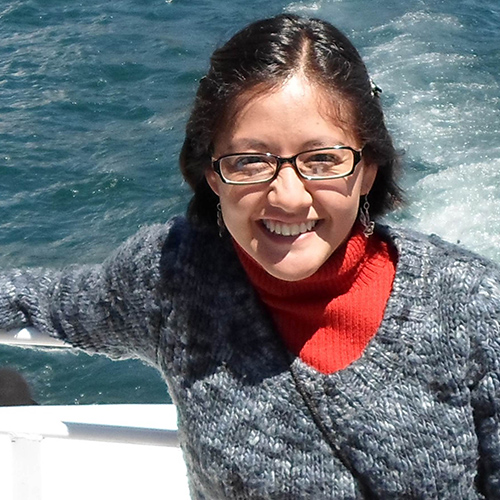Karla Infante
About
 I was born in Mexico City, one of the world’s largest cities. Despite this, during all my life I had a great interest in studying nature, and for this reason I decided to study biology (2000-2005) obtaining a BSc degree from the Universidad Autonoma Metropolitana. My academic background went primarily to the human nature relationship, using interdisciplinary approaches. In 2009 I started a Master’s degree in natural resources and development in El Colegio de la Frontera Sur Chetumal, México, wherein I completed a thesis entitled “Valuation of landscape units in the Mayan zone of Quintana Roo Mexico”. This research was based on Ecological Economics and Ethnoecology applied to the Mayan villages of Quintana Roo.
I was born in Mexico City, one of the world’s largest cities. Despite this, during all my life I had a great interest in studying nature, and for this reason I decided to study biology (2000-2005) obtaining a BSc degree from the Universidad Autonoma Metropolitana. My academic background went primarily to the human nature relationship, using interdisciplinary approaches. In 2009 I started a Master’s degree in natural resources and development in El Colegio de la Frontera Sur Chetumal, México, wherein I completed a thesis entitled “Valuation of landscape units in the Mayan zone of Quintana Roo Mexico”. This research was based on Ecological Economics and Ethnoecology applied to the Mayan villages of Quintana Roo.
Place
The Yucatan Peninsula is characterized as an area of high biological and cultural diversity. I work in the State of Quintana Roo in both, inland and in the coast. With respect to inland, my study7 sites are Mayan communities which are organized into common holdings called “ejidos” and speak the Mayan-Yucatec language in their daily life. Therein there is a close relationship between society and nature through strategies of multiple uses of local natural resources. The main uses given to the forest are slash-and- burn shifting agriculture called “milpa”, the extraction of precious woods; the extraction of resin (gum) of the zapote tree, game or (hunting of animals such as deer, peccary, among others), fishing in water bodies located in the middle of the jungle. In the coastal zone I do work with communities that depend on the coral reef system for livelihoods. The major livelihoods of these communities are fishing and tourism.
Research
Since I graduated from my Master’s (2011) I have continued working in the Maya Zone of Quintana Roo in a ECOSUR’s project, and during 2012, I was hired as research assistant in a project that was addressing the management plan of the spiny lobster. My academic interests are focused on generating useful information for the integral management of ecosystems using interdisciplinary approaches, including Ethnoecology and Ecological Economics. Currently, in my Doctorate program I want to address the local adaptation strategies to climatic variability in Quintana Roo, working on two case studies, one inland (Maya Zone) and the other in the coastal zone (communities of Xcalak, Mahahual, and Punta Allen).
Key Publications
- Infante-Ramírez K. D., A.M. Arce-Ibarra, E. Bello-Baltazar. Non-Monetary Valuation of Landscape units in the Mayan Zone from Quintana Roo, México. (Valoración no monetaria de unidades de paisaje en la zona maya de Quintana Roo, México). Economía Sociedad y Territorio. Vol. XIV (45). In Press.
- Infante-Ramírez K. D. and A.M. Arce-Ibarra. Local perception of the ecological services and well-being of the Maya Zone´s rainforest from Quintana Roo, Mexico. (Percepción local de los servicios ecológicos y de bienestar de la selva de la zona maya en Quintana Roo, México). Investigaciones Geográficas. Pre-print, ISSN:0188-4611
- Macario-Mendoza P.A., A.M. Arce-Ibarra, M.E. García-Contreras, A. Segundo-Cabello, E.I.J. Estrada-Lugo, E. Bello-Baltazar, L.C. Sánchez-Pérez, K.D. Infante-Ramírez, and I. Sánchez-Vázquez. 2012. Social and environmental innovation: experiences in the Maya region of Quintana Roo (Innovación socioambiental: experiencias en la zona maya de Quintana Roo) In: La Otra Innovación para el Ambiente y la Sociedad en la Frontera Sur de México. 171-181 p.


